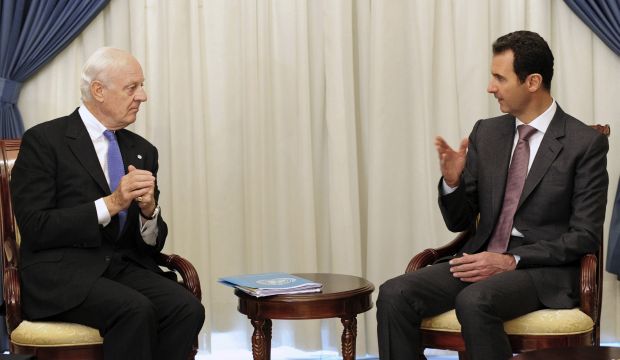
In this Nov. 10, 2014, file photo released by the Syrian official news agency SANA, Syrian President Bashar Al-Assad, right, speaks with United Nations envoy to Syria Staffan de Mistura in Damascus, Syria. (SANA via AP, File)
In a rare show of unity, the UN Security Council on Monday announced its backing of a 16-point statement that urges political transition and backs a plan to set up working groups to resolve the conflict that has killed more than 250,000 people and displaced almost half of the population of Syria.
The statement calls for the establishment of “a Syrian-led political process leading to a political transition that meets the legitimate aspirations of the Syrian people.” But it makes no mention of the fate of Assad whose future is a major point of contention among rivals.
It also calls for the establishment of “an inclusive transitional governing body with full executive powers, which shall be formed on the basis of mutual consent while ensuring continuity of governmental institutions.”
The peace plan, which is expected to be put into effect in September, also proposes the formation of four working groups to discuss “safety and protection, counterterrorism, political and legal issues and reconstruction.”
According to analysts, the peace plan, although in itself a sign of consensus between Washington and Moscow who is a key Assad ally, is unlikely to lead to a breakthrough as it fails to address the core of the Syrian crisis: The fate of Assad.
Similar convictions have been echoed by moderate Syrian opposition figures who cite the increasing targeting of civilians by Assad’s forces as “undermining” to international peace efforts.
“The UN statement is a good and new step,” Mohamed Maktabi, a member of the Syrian National Coalition politburo, said, expressing hope that the recent international consensus on Syria will lead to “a serious” push for transition.
“We have been, and still are, in support of a political solution … and we will deal positively with the council’s statement although we believe there are some points that need further clarifications,” he said.
Those points will be discussed with the UN’s Special Envoy to Syria Staffan de Mistura and will be the centerpiece of discussions within the working groups, according to Maktabi.
The members of the four committees will be selected both from the Syrian government and opposition.
Maktabi said the Coalition will ask de Mistura for further clarifications about who will represent the government in the working groups, what purpose the four groups will serve and how they will operate.
Haytham Manna, an opposition figure from outside the Coalition, told Agence France-Presse that preparations were already under way to choose members for the four groups.
Assad’s fate will be a key topic in any future negotiations with the Syrian government, Maktabi said, adding that the opposition will not bypass the will of the Syrian people who reject categorically any role for Assad in the future of Syria.
The proposed peace plan is based on the Geneva communique—a document adopted by UN in June 2012 for the formation of a transitional governing body with full executive powers and made up of members from the current government and opposition.
According to analysts, several factors have contributed to the endorsement of the peace plan, most importantly the growing need to confront the Islamic State of Iraq and Syria (ISIS)—who has eclipsed moderate opposition groups in Syria— and the diplomatic breakthrough between Washington and Tehran in the wake of the Iran nuclear deal.
Previous UN-sponsored talks between the government and the opposition have collapsed, as both sides failed to see eye to eye on the fate of Assad.
